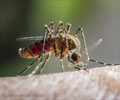Brazil has been the epicentre of the Zika outbreak now affecting 58 countries and territories, with around 1.5 million people infected in the country.

‘Zika virus causes the rare but serious neurological disorder Guillain-Barre Syndrome, which is mainly spread by two species of Aedes mosquito and transmits through sexual contact’





The UN health agency, along with the Pan American Health Organization (PAHO), reiterated its recommendation to pregnant women "not to travel to areas with ongoing Zika virus transmission." "This includes Rio de Janeiro," the organisations said in a joint statement.
Brazil has been the epicentre of the Zika outbreak now affecting 58 countries and territories, with around 1.5 million people infected in the country since 2015.
The virus, which also causes the rare but serious neurological disorder Guillain-Barre Syndrome, is mainly spread by two species of Aedes mosquito but has also been shown to transmit through sexual contact.
The Olympics and Paralympics, set for August 5 through September 18, "will take place during Brazil's wintertime when there are fewer active mosquitoes and the risk of being bitten is lower," WHO stressed.
Advertisement
It also said they should avoid visiting impoverished and overcrowded areas with poor sanitation, where the risk of mosquito bites is higher.
Advertisement
For the partners of pregnant women, the agency said they should practice safe sex for the remainder of the pregnancy, or abstain completely until the baby is born.
Source-AFP















